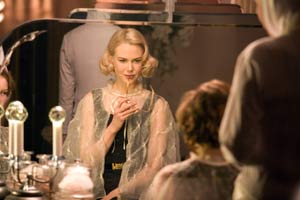 As a scholar of religion, a liberal Christian (yes, we do exist), and a lover of great fantasy literature, I am deeply saddened by the growing wave of fearful-to-the-point-of-hysterical online chatter about Philip Pullman’s “His Dark Materials” trilogy, which was sparked by the upcoming Dec. 7 release of the film version of the first book, “The Golden Compass.”
As a scholar of religion, a liberal Christian (yes, we do exist), and a lover of great fantasy literature, I am deeply saddened by the growing wave of fearful-to-the-point-of-hysterical online chatter about Philip Pullman’s “His Dark Materials” trilogy, which was sparked by the upcoming Dec. 7 release of the film version of the first book, “The Golden Compass.”
Just last week my fellow Beliefnet blogger Rod Dreher fed the frenzy. His Crunchy Con post waxes poetically and mournfully about his “children losing God, especially before they have a firm hold on Him,” particularly” to the work of a man who openly says he wishes to destroy God in the minds of his audience”–and thus, according to Dreher, who threatens to suck all the happiness out of life. Dreher ends with an insulting generalization about liberals, and how “because liberals refuse to take God seriously, [we] have trouble understanding people–Jews, Muslims, Christians and others–who do.”
Give me a break.
I’m a liberal and I’m a Christian. I also take God seriously. Very. And so does Philip Pullman.
One of the things I love most about Pullman’s trilogy (aside from the fact that it is one of the greatest literary treasures of our time) is the thought Pullman gives to God. Pullman spends more time–far more, I suspect–contemplating the divine, the nature of God, and how we conceive of our relationship to God than most Christians do in an entire lifetime. He has gifted us with a provocative, stunning fantasy that revels in the deepest of cosmic questions, and they are questions near and dear to the heart of Christianity.
And my contention, as a scholar, a Christian, and someone who has read the trilogy more times than I can count, is that the telos of Pullman’s “His Dark Materials” is to save God, not kill him.
Take that, my fellow fearful Christians.
The soundbyte that everyone loves pulling from Pullman (so to speak), that his books “are about killing God,” I would amend to say that his works actually are about challenging a certain corrupt, destructive image of a god-who-is-not-really-a-god at all–and I’d add that the “killing” he speaks of is not actually killing at all (but then, you need to read the books to find out why–do your homework, people).
I know that’s what he did for me. But then, I read the books. Did you?
Perhaps it’s not so much that liberals don’t take God seriously and therefore can’t understand people who do, it’s more that believers and the faithful who aren’t afraid of challenges to traditional images of God and to interpretations of their faith’s story and message, and who desire a lively dialogue about faith and not a pre-determined one–we get villainized as godless.


